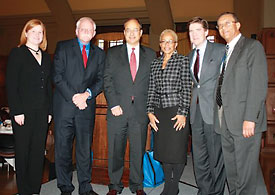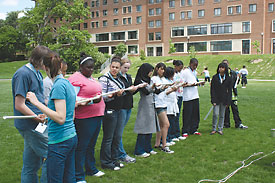Related story:
Students say new outreach program inspires, builds interest in U-M >
Just over a year old, the Center for Educational Outreach has established several new programs targeted at junior and high school students, teachers and principals, and it has become a conduit for numerous pre-existing programs that seek to bridge the gap between secondary and post-secondary education.

But CEO’s director says the program has only scratched the surface of what needs to be done to improve the educational pipeline in urban areas that are faced with major budget cuts, and that serve impoverished neighborhoods where many students have parents who have lost jobs.
Spend a few moments with William Collins and his staff members, though, and it’s clear these challenges serve as energizers that drive their creativity in organizing programs and events to engage the various groups and individuals that must be part of making changes.
“If you’re concerned about what you see taking place in your communities, here’s what you can do,” is the overall message he and the staff take to school principals, teachers and the students they serve, and well as to various campus organizations involved in outreach.
“The economy has been a real wake-up call. The high-paying blue collar jobs are disappearing. Those jobs are not going to be there. It’s easier to make that point now. The wake-up call has been heeded. Students see the impact, even though they don’t quite know what to do.”
That’s where the center comes in. Announced by Senior Vice Provost Lester Monts at the Diversity Summit in October 2007 and open for business in July 2008, the CEO “seeks to serve as a coordinating hub for the expansion of community outreach programming and educational partnerships, as well as strengthening relations with K-12 education,” according to its Web site. A key goal of the program is to help students in urban areas see that college is important and possible, and that a Michigan education is within reach.
During the first year, Collins hired professional staff members to manage a range of programs, including:
• College Corps, that prepares high school students for post-secondary education. CEO partners with Project Community, a service-learning program housed in the Ginsberg Center.
• Michigan Pre-College and Youth Outreach Conference, a one-day event that brings together leaders in education, work force development and government across Michigan to engage with other professionals interested in strengthening support for pre-college and youth development programming, and college access in Michigan.
• Middle and High School Partnerships that works with middle and high school students, faculty and staff throughout the state to promote academic excellence and encourage college aspiration.

• The Real on College, uses interactive theatre as a vehicle to sparking dialogue that engages high school students in discussions that address stereotypes, biases and myths of higher education.
• Supporting Student Educational Outreach, grants to encourage U-M student involvement in K-12 educational outreach activities.
• Speakers Bureau of faculty and staff who can offer presentations, lectures or technical/professional assistance to schools and community agencies.
• Youth Leadership Experience to provide leadership training for high school students to help prepare them for college and beyond.
• University Outreach Council of representatives from units on campus that engage in educational outreach.
• Conversations on Promoting Pathways and Access to Higher Education, a speaker series featuring nationally recognized scholars and practitioners created to promote a campuswide scholarly discourse on topics related to educational outreach and access to college. The series is co-sponsored by Projects Promoting Equity in Urban and Higher Education and the National Center for Institutional Diversity.
The center also worked to identify all of the individual programs in units across campus that already conduct outreach, with the goal of providing one central resource, and to offer support and sometimes funding, to those programs. For example, some 24 summer programs take place across campus with the goal of encouraging junior and senior high school students, often from underrepresented minorities, to experience campus and see that college is a realistic goal. The CEO has been able to assist with funding for some of the programs, and works to encourage participation in them through unified promotion within the schools.
“A goal of many of the programs is to reach first generation, urban students well before 11th and 12th grades, when most admissions programs are calling and the die already has been cast,” Collins says.
“We have to be able to turn around our urban schools. We have a rare opportunity now.”

